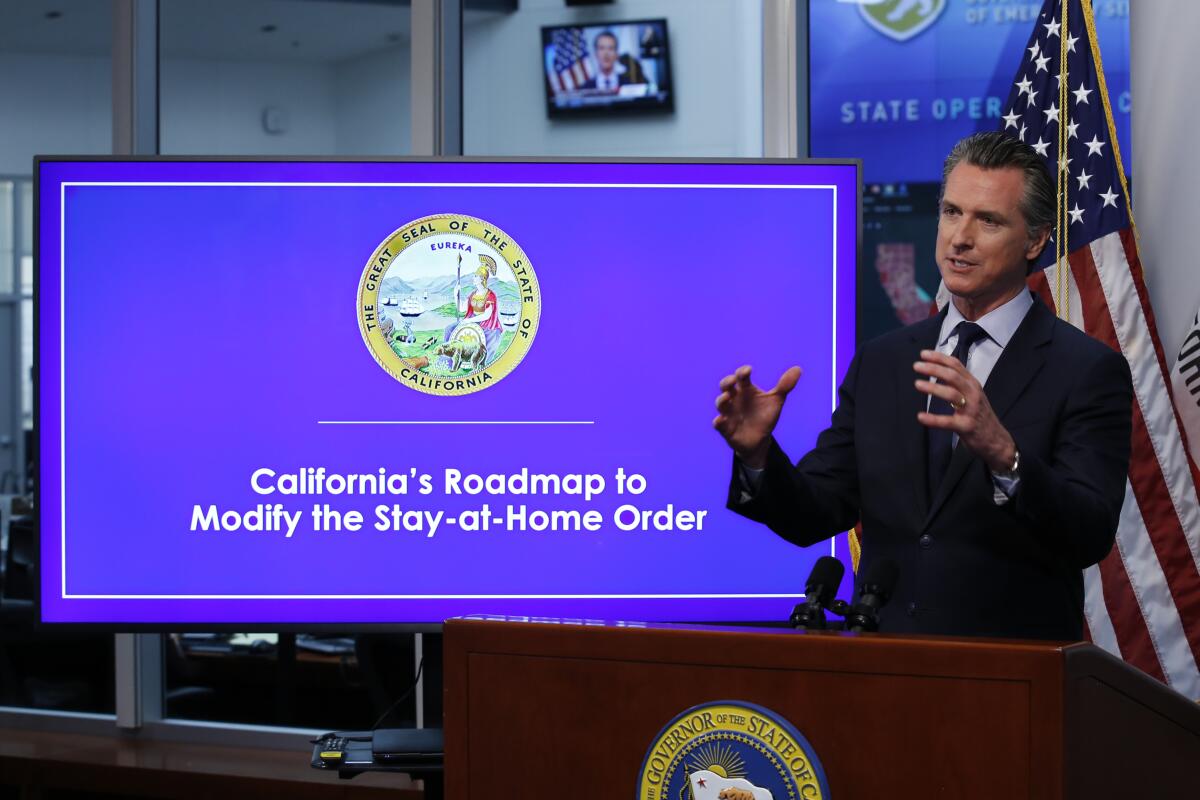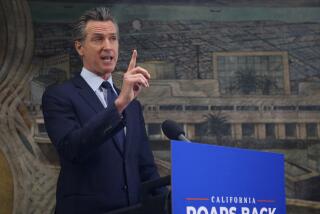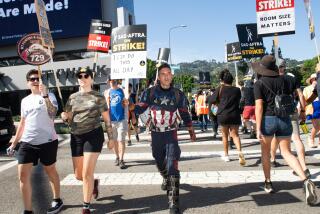Newsom’s secretive $1-billion mask deal with Chinese automaker sparks bipartisan concerns

SACRAMENTO — Gov. Gavin Newsom‘s decision to spend almost $1 billion in taxpayer funds to buy protective masks drew national attention as an aggressive move by California to solve one of the most nagging problems of the coronavirus crisis.
But almost two weeks after he announced the deal during a cable TV interview, very few details have been disclosed. The governor’s advisors have so far declined requests for information about the agreement with BYD, the Chinese electric car manufacturer hired to produce the masks, though the state has already wired the company the first installment of $495 million.
Newsom, who has been praised for his efforts to slow the spread of the disease, bristled on Saturday at suggestions that his administration has been too slow to explain a deal that will cost California taxpayers 30% more than his January budget would spend on infectious disease prevention for an entire fiscal year.

“I’m for outcome here,” Newsom shot back when asked by a reporter about withholding the contract’s details. “Some are consumed by process, personality, intrigue. Who’s up, who’s down. We are for actually solving a major, major problem — not only for the state but potentially a template for the country.”
But a bipartisan chorus of concerns has emerged in the Legislature. Lawmakers have grown increasingly frustrated that the governor’s advisors have asked only for expedited approval to spend money without briefing them on what has been agreed to.
“I must emphasize, that’s a big deal,” state Sen. Jim Nielsen (R-Gerber) said of the agreement during a legislative oversight hearing on Thursday. “And what is in the contract that ensures the deliverability — timely — is going to be really, really important. At the least, we cannot be just throwing out a false hope to people.”
BYD, a Shenzhen-based company whose initials stand for “Build Your Dreams,” has staked its reputation on building electric vehicles. It has a U.S. subsidiary based in Los Angeles, with a vehicle manufacturing facility in Lancaster. The company currently employs about 1,000 people in California, a company spokesman said.
Exactly how BYD has converted some of its manufacturing efforts in China to begin producing protective masks is unclear. On March 13, it touted the creation of “the world’s largest mass-produced face masks plant” in a news release posted on the company’s website. The company announced that it would make 5 million masks a day — far surpassing the 100 million masks a month promised by 3M, the company best known for producing N95 masks, used to help prevent the spread of the coronavirus.
A spokesman for BYD referred all questions about negotiations over the purchase of masks to Newsom’s office.
Newsom and other top officials have described the gambit as straightforward: Leverage the state government’s purchasing power, backed up by a multibillion-dollar cash surplus, to buy 200 million masks a month. The masks would then be distributed to healthcare and emergency workers across California, a supply chain that would continue through the end of June.
Administration officials have said that each monthly shipment from BYD will contain 150 million N95 masks and 50 million surgical masks.
“We made a big, bold bet on a new strategy, and it is bearing fruit,” Newsom said on April 8.
That same day, The Times asked for a copy of the contract to purchase the masks. On Monday, the Governor’s Office of Emergency Services delayed responding to the request until May 4.
BYD is well known in California government circles. In 2013, then-Gov. Jerry Brown announced the company’s decision to build electric buses in Southern California during a trade mission to China. It was a key component of the state’s efforts to reduce greenhouse gases, he said.
“I think it’s very important that we start replacing the bus fleet with electric buses,” Brown said during a tour of BYD’s Shenzhen facility.
But there were criticisms of BYD’s work in California. Problems with some of the company’s electric buses were chronicled in a Times investigation in 2018. The former chief counsel of a competing company said in a 2013 letter to Long Beach officials that BYD had “a history of overpromising and underdelivering.”
Workplace conditions have also come under scrutiny. California safety officials investigated the BYD facility four times between the summer of 2014 and last spring, according to records reviewed by The Times, alleging 20 different workplace violations.
Among the violations alleged at the Lancaster electric car plant last year were errors in the proper use of respirators — safety masks — for its employees.
A company spokesman declined to comment on any of the workplace citations because of pending legal action.
In the years since it set up shop in California, BYD has quietly but steadily ramped up its governmental and political presence. The company has spent more than $1 million lobbying state officials since 2014 and made a $50,000 contribution to the 2018 ballot measure campaign to keep in place California’s new taxes on gas and diesel sales.
In 2015, the Governor’s Office of Business and Economic Development awarded BYD a $3-million tax credit to expand its manufacturing in California to other kinds of electric vehicles. But the company forfeited more than $1 million of the incentive.
“The tax credit was based on an optimistic business forecast that was ultimately revised,” company spokesman Frank Girardot said in an email.
The announcement of new mask production by BYD leadership in China came at just the right moment for California, as the Newsom administration scrambled for protective gear while cases of the novel coronavirus began to mount.
“Look, we’ve been competing against other states, against other nations, against our own federal government” for safety equipment, Newsom told MSNBC host Rachel Maddow on April 7. “We’re not waiting around any longer.”
The next day, the governor’s director of emergency services, Mark Ghilarducci, told reporters that BYD’s California-based subsidiary was key to the $990-million deal.
“This is an organization that has a manufacturing capability that is specifically designed to meet this need,” Ghilarducci said, citing BYD’s operations in China.
But almost immediately, lawmakers wondered why the Newsom administration wouldn’t allow them to review the contract before asking for the first payment to BYD.
“We would never approve a budget this way,” Assemblyman Phil Ting (D-San Francisco), chairman of the Assembly Budget Committee, said in an interview on April 9, two days after the deal was announced. “The whole reason we don’t do a budget one request at a time is we want to know the big picture.”
That same day, a letter from the Joint Legislative Budget Committee demanded details, including the performance standards expected of BYD, the price per mask and delivery timelines. But none of those specifics have, so far, been provided to legislators.
On April 13, three days after the initial $495-million payment, Ghilarducci said that the state was still “in the final negotiation phases” and that the agreement would be kept private until that process was complete.
Three days later, Newsom advisors offered a different explanation. During testimony before a special state Senate budget hearing examining the pandemic’s impact on California’s economy and government finances, lawmakers were told that revealing the contract’s details too soon could mean someone else — not California — might get the masks. Similar problems have arisen in other states, including seizures of supplies by the federal government.
“We have concerns about releasing too many details of it because, again, our goal is to get the supply into California for the people who need it,” said Tina Curry, deputy director of the Governor’s Office of Emergency Services. “There are a lot of things that could come into play to disrupt that, to influence that or interfere with that in some way.”
During a taped appearance on “The Ellen DeGeneres Show” that aired on Friday, Newsom voiced similar concerns.
“We haven’t yet seen the benefits of those efforts,” he said of the mask purchase. “I’m not holding my breath. We have backups to that backup.”
On Saturday, while visiting Santa Clara County to discuss efforts to help COVID-19 patients who are homeless, Newsom insisted the BYD contract is complete and that he’s revealed an “appropriate” amount of information given the difficulty in actually getting protective gear to its final destination.
“I recognize everybody’s desire to have everything out there tomorrow,” he said. “And we look forward to all those details becoming public very, very shortly.”
More to Read
Sign up for Essential California
The most important California stories and recommendations in your inbox every morning.
You may occasionally receive promotional content from the Los Angeles Times.











